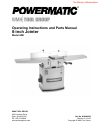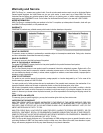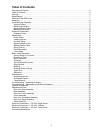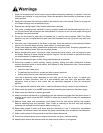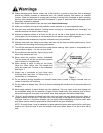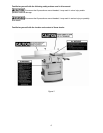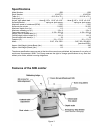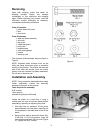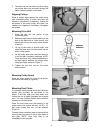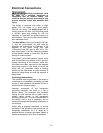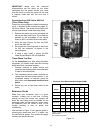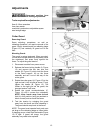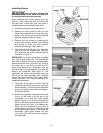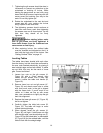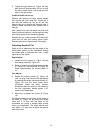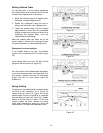
4
Warning
1. Read and understand the entire owner’s manual before attempting assembly or operation. Know the
limitations and hazards in using the jointer. Decals are placed on each machine as reminders of good
safety practice.
2. Read and understand the warnings posted on the machine and in this manual. Failure to comply with
all of these warnings may cause serious injury.
3. Replace the warning labels if they become obscured or removed.
4. This jointer is designed and intended for use by properly trained and experienced personnel only. If
you are not familiar with the proper and safe operation of a jointer, do not use until proper training and
knowledge have been obtained.
5. Do not use this jointer for other than its intended use. If used for other purposes, WMH Tool Group
disclaims any real or implied warranty and holds itself harmless from any injury that may result from
that use.
6. Use extra care in the location of the jointer in the shop. Place the machine so that potential kickback
area is not in line with aisles, doorway, wash stations, or other work areas.
7. Always wear approved safety glasses/face shields while using this jointer. Everyday eyeglasses only
have impact resistant lenses; they are not safety glasses.
8. Before operating this jointer, remove tie, rings, watches and other jewelry, and roll sleeves up past
the elbows. Remove all loose clothing and confine long hair. Non-slip footwear or anti-skid floor strips
are recommended. Do not wear gloves.
9. Wear ear protectors (plugs or muffs) during extended periods of operation.
10. Some dust created by power sanding, sawing, grinding, drilling and other construction activities
contains chemicals known to cause cancer, birth defects or other reproductive harm. Some examples
of these chemicals are:
• Lead from lead based paint.
• Crystalline silica from bricks, cement and other masonry products.
• Arsenic and chromium from chemically treated lumber.
Your risk of exposure varies, depending on how often you do this type of work. To reduce your
exposure to these chemicals, work in a well-ventilated area and work with approved safety
equipment, such as face or dust masks that are specifically designed to filter out microscopic
particles.
11. Do not operate this machine while tired or under the influence of drugs, alcohol or any medication.
12. Make certain the switch is in the OFF position before connecting the machine to the power supply.
13. Make certain the machine is properly grounded.
14. Make all machine adjustments or maintenance with the machine unplugged from the power source. A
machine under repair should be RED TAGGED to show that it should not be used until maintenance
is complete.
15. Remove loose items and unnecessary work pieces from the area before starting the machine.
Remove adjusting keys and wrenches. Form a habit of checking to see that keys and adjusting
wrenches are removed from the machine before turning it on.
16. Keep safety guards in place at all times when the machine is in use. If removed for maintenance
purposes, use extreme caution and replace the guards immediately upon completion of maintenance.
17. Make sure the jointer is firmly secured to the floor or bench before use.
18. Provide for adequate space surrounding work area and non-glare, overhead lighting.
19. Keep the floor around the machine clean and free of scrap material, oil and grease.



